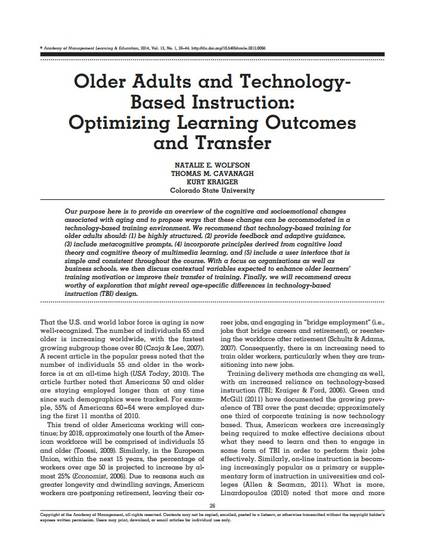
Article
Older Adults and Technology-Based Instruction: Optimizing Learning Outcomes and Transfer
Academy of Management Learning & Education
(2014)
Abstract
The purpose of this paper is to provide an overview of the cognitive and socio-emotional changes associated with aging and to propose ways in which these changes can be accommodated in a technology-based training environment. We recommend that technology-based training for older adults should: 1) be highly structured, 2) provide feedback and adaptive guidance, 3) include meta-cognitive prompts, 4) incorporate principles derived from cognitive load theory and cognitive theory of multimedia learning, and 5) include a user interface that is simple and consistent throughout the course. With a focus on organizations as well as business schools, we then discuss contextual variables that are expected to enhance older learners' training motivation or improve their transfer of training. Finally, we will recommend areas worthy of exploration that might reveal age-specific differences in TBI design.
Keywords
- Technological innovations,
- Business education,
- User interfaces,
- Educational technology,
- Instructional systems,
- Integrated learning systems
Disciplines
Publication Date
March, 2014
Publisher Statement
Originally published as Wolfson, N. E., Cavanagh, T. M., & Kraiger, K. (2014). Older adults and technology-based instruction: Optimizing learning outcomes and transfer.Academy of Management Learning & Education, 13(1), 26-44.
Citation Information
Natalie Wolfson, Thomas M. Cavanagh and Kurt Kraiger. "Older Adults and Technology-Based Instruction: Optimizing Learning Outcomes and Transfer" Academy of Management Learning & Education Vol. 13 Iss. 1 (2014) p. 26 - 44 ISSN: 1537-260X Available at: http://works.bepress.com/thomas_cavanagh/3/
